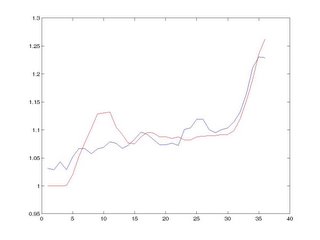Does Physiology Predict Behavior?

One of my ongoing projects involves a comparison of behavioral data with physiological data collected while participants viewed humorous television ads (see previous post here). The question, I believe, is an interesting one: which physiological measures predict expression of attitudes through continuous response measurement (i.e., using a slider bar to report your attitude during an entire ad)?
I have spent the past couple of weeks attempting to identify extant data analysis procedures to help me answer this question. Alas, so far I am unsatisfied with the results. So, I am turning to MATLAB, wherein I am programming a custom model to examine the question.
The model attempts to predict continuous response data (from positive to negative) from physiological data collected during those same ads with a different group of subjects. Since physiology may lag continuous response (i.e., we know skin conductance is a slow responder, whereas it takes well less than a second to press a computer keyboard), the model will also attempt to fit the data with various time lags.
The logic to this is that some cognitive event may trigger both a shift in CRM and a change in physiological state. However, it may take longer for the change in physiological state to manifest itself. Further, the physiological responses are reflexive in nature, whereas the CRM task is a controlled task. Thus, we would not expect the causal arrow to point the other direction. That is, CRM does not cause the physiological responses ... especially since the physiology group did not perform the CRM task.
Although work is ongoing, the Figure here shows an early model fit. Here the red line shows the actual CRM data for an ad (see ad description), and the blue line shows the model's predictions based upon the physiology group. The best fit, interestingly, had no lag for skin conductance or zygomatic EMG data, and it had a 2 second lag for heart rate data. This is still a work in progress, but it's fun for now!




 FOLLOW SAM ON TWITTER
FOLLOW SAM ON TWITTER
 SUBSCRIBE TO THIS FEED
SUBSCRIBE TO THIS FEED

0 Comments:
Post a Comment
<< Home